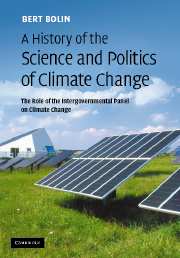 A History of the Science and Politics of Climate Change
A History of the Science and Politics of Climate Change Book contents
- Frontmatter
- Contents
- Foreword by Bo Kjellén
- Abbreviations
- Part I The early history of the climate change issue
- Part II The climate change issue becomes one of global concern
- 5 Setting the stage
- 6 The scientific basis for a climate convention
- 7 Serving the Intergovernmental Negotiating Committee
- 8 The IPCC second assessment report
- 9 In the aftermath of the IPCC second assessment
- 10 The Kyoto Protocol is agreed and a third assessment begun
- 11 A decade of hesitance and slow progress
- Part III Are we at a turning point in addressing climate change?
- Some concluding remarks
- Notes
- References
- Name index
- Subject index
7 - Serving the Intergovernmental Negotiating Committee
Published online by Cambridge University Press: 03 May 2010
- Frontmatter
- Contents
- Foreword by Bo Kjellén
- Abbreviations
- Part I The early history of the climate change issue
- Part II The climate change issue becomes one of global concern
- 5 Setting the stage
- 6 The scientific basis for a climate convention
- 7 Serving the Intergovernmental Negotiating Committee
- 8 The IPCC second assessment report
- 9 In the aftermath of the IPCC second assessment
- 10 The Kyoto Protocol is agreed and a third assessment begun
- 11 A decade of hesitance and slow progress
- Part III Are we at a turning point in addressing climate change?
- Some concluding remarks
- Notes
- References
- Name index
- Subject index
Summary
The IPCC is reorganised and begins another scientific assessment; an optimistic attitude still prevails, although sceptics increase their objections.
Changes in the IPCC structure and new members of the Bureau
The IPCC had implicitly been given a clear task by the large number of countries that signed the FCCC in Rio: i.e. to continue the assessments and serve the INC in its work towards a first meeting with the parties of the Convention that might take place within the next few years. Signatures from only 50 countries were needed for the convention to come into force. Our understanding of the environmental aspects of the issue now needed to be broadened and a more penetrating assessment was needed of the impacts of a climate change and its associated costs, together with socio-economic studies of the implications of mitigation and adaptation. But whenever value judgements were an essential part of such issues, care had to be exercised in order to avoid criticism of the IPCC efforts because of possible implicit political assumptions in the course of the analyses.
As was pointed out in Section 6.5, it was for the IPCC to judge how the expression dangerous interference with the climate system should be interpreted, but it was of course still important that relevant information was provided to serve as a basis for political analyses and negotiations. This was more important now, when industries were gradually becoming aware of the possible threats to their activities, which was how many of their representatives viewed the emerging situation.
- Type
- Chapter
- Information
- A History of the Science and Politics of Climate ChangeThe Role of the Intergovernmental Panel on Climate Change, pp. 79 - 105Publisher: Cambridge University PressPrint publication year: 2007
